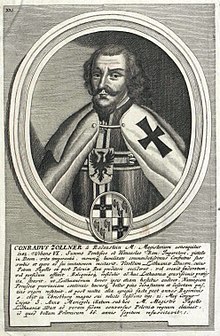Konrad Zöllner von Rotenstein

Konrad Zöllner von Rotenstein (* around 1325 probably in Birkenfeld ( Haßberge ); † August 20, 1390 in Christburg ) was the 23rd Grand Master of the Teutonic Order from 1382 to 1390 . His name is also written in the variants "Conrad", "Zollner" and "Rot (t) enstein". The Zollner von Rottenstein are a Franconian knight family named after the former Rottenstein Castle .
Life
In 1353 Konrad became the keeper of Prussian Mark and in 1368 Commander of Danzig . In 1372 he became supreme trappers and commander of Christburg . Although he was not in close contact with influential knights of the order and was without political experience, Konrad was elected Grand Master on October 5, 1382 after the death of Grand Master Winrich von Kniprode . His main concern was to deal with the country's internal problems. He left the command of the troops and the war with the Grand Duchy of Lithuania to Konrad von Wallenrode , who was appointed Order Marshal and Commander of Königsberg . In 1383 the baptism of the Lithuanian grand dukes, which had been prepared at great expense, failed.
Konrad reformed the administrative units of Prussia , supported the development of unpopulated areas and tried to found a university in Kulm , which failed in 1387. He granted Passenheim town charter in 1386 . In his capacity as a financial expert, like his predecessor, his focus was on the further fight against usury . In 1386 the maximum interest rate was lowered again from 10% to 8.33%; Violations were punished with the withdrawal of the capital.
From 1386, the general foreign policy situation deteriorated due to the union of Poland-Lithuania , the simultaneous Christianization of the Lithuanian grand princes and their rise to Polish kings.
Under Konrad, the first signs of a crisis in the religious state became visible; aggravated by the plague epidemic of 1383 as well as floods, poor harvests, decline in fishing results and decline in trade with Poland.
Konrad died in Christburg. His body was buried in the Marienburg in the Grand Masters' mausoleum under the St. Anna chapel.
See also
- Bishops: Martin von Lynow , Heinrich Kuwal
- Coins: four
- Trading ban in the Hansekontor Bruges in 1388
Web links
Individual evidence
- ^ Bernhart Jähnig: Customs officer von Rotenstein, Konrad . In: East German Biography (Kulturportal West-Ost)
literature
- Friedrich Borchert: The Grand Masters of the Teutonic Order in Prussia appeared in the "Preußische Allgemeine Zeitung" on November 24, 2001.
- Bernhart Jähnig : Konrad Zöllner von Rotenstein. In: New German Biography (NDB). Volume 12, Duncker & Humblot, Berlin 1980, ISBN 3-428-00193-1 , p. 516 ( digitized version ).
- Karl Lohmeyer : Konrad Zöllner von Rotenstein . In: Allgemeine Deutsche Biographie (ADB). Volume 45, Duncker & Humblot, Leipzig 1900, pp. 429-431.
Web links
| personal data | |
|---|---|
| SURNAME | Konrad Zöllner von Rotenstein |
| ALTERNATIVE NAMES | Conrad Zöllner von Rotenstein; Konrad Zollner von Rotenstein; Konrad Zöllner von Rottenstein; Konrad Zollner von Rottenstein |
| BRIEF DESCRIPTION | Grand Master of the Teutonic Order |
| DATE OF BIRTH | 14th Century |
| DATE OF DEATH | August 20, 1390 |
| Place of death | Christburg |


